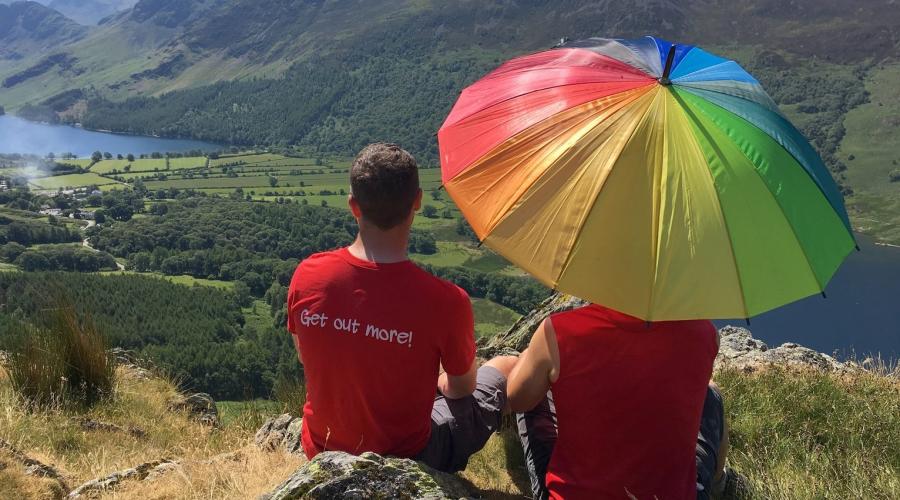Lowther Castle, Askham Fell and Ullswater
5 people attending
15 places left
Askham Fell is the high ground between the valley of the River Lowther, to the east, and Ullswater to the west. From this high ground, at around 320 metres, there are great views of Ullswater and its western fells and, to the east, of the Pennines. On Askham Fell are mysterious Bronze Age remains, including a stone circle known as the Cockpit. To the east of the fell, in the valley, is Lowther Castle - built in the early years of the 19th century but abandoned and reduced to ruin in the 1950s. Today, it is an empty shell of a building and an enigmatic ghost of what it once was.
Join us on an 13 mile / 21 kilometre circular walk through this varied landscape of open moorland, parkland, farmland and a short stretch of the Ullswater shoreline into Pooley Bridge. We'll be walking on grass, stony limestone tracks and some short stretches of surfaced country lanes. Total ascent over the course of the walk is around 460 metres. A quick pub or café stop on route may be possible.
By train: there's a train at 08:00 from Manchester Piccadilly to Penrith, arriving 09:52. If travelling by train, message the event leader in advance and it should be possible to arrange a lift from, and return to, Penrith railway station.
IMPORTANT! - Participation Statement
You MUST complete a Participation Statement, in addition to booking your event space before attending an OutdoorLads event. You only need to complete this Participation Statement once, not for each event you attend.
Anyone with COVID-19 symptoms, even if they are extremely mild, or who has recently tested positive for Covid-19, is asked not to attend.
Photo credits: Lowther Castle © Jan den Ouden from Pixabay and used in line with the Pixabay Licence; the Cockpit stone circle © Chris Heaton from Geograph and used in line with Creative Commons licence (cc-by-sa/2.0). All other photos are by Rachel Ramsden and the event leader, with permission granted to OutdoorLads for their use.


What to bring
Boots: your most important piece of kit: comfortable, waterproof, breathable and designed for hiking. Trainers may be OK, depending on how rough the ground is and if its dry. Socks: proper walking socks will keep your feet dry and help prevent blisters. Gaiters: recommended for wet weather or boggy conditions.
Layered clothing: lets you quickly adapt to changes in the weather and to body temperature. Go for a base layer (vest or t-shirt), a mid layer (micro-fleece or shirt) and in cooler weather add an outer layer (windproof jacket or thick fleece). Trousers: avoid jeans as they become heavy and cold in the rain, and take ages to dry out. Breathable fabrics are more comfortable and dry more quickly. On warm days shorts may be OK.
Waterproof jacket: carry one in your rucksack when walking in all but the calmest of weather. Breathable fabrics are more comfortable and dry.
Hat or cap: useful for staying warm in winter and shaded in summer. Gloves: essential in winter and ideally waterproof.
Day rucksack: typically 20-30 litres, this should be comfortable to wear and allow you to use your arms freely.
Sunglasses: for any sunny day, even in winter. Sun cream: can be useful even on cloudy and winter days.
Lunch: bring a packed lunch unless otherwise stated. Snacks: a range of biscuits, energy bars, bananas, chocolate or dried fruit (for example) are always good to have. Put them in your rucksack where they are easy to grab..
Water and other fluid: bring between one and two litres, depending on season of the year and temperature. A combination of water, fruit juice, energy drinks and a hot drink is a good idea.
Medicines: essential if you have hay fever, diabetes, minor ailments, etc. A personal first aid kit with bandages and paracetamol or ibuprofen (for your own use only) is also a good idea.
Hand sanitiser and a face covering: whilst we are living with Covid-19, please bring your own to events in order to keep everyone safe.
Food & drink
Bring a substantial packed lunch, snacks for along the way and plenty of water or other fluids (one to two litres) to drink. A hot drink is recommended, depending on the weather!
A quick pub or café stop on route, in Pooley Bridge, may be possible, depending on progress.